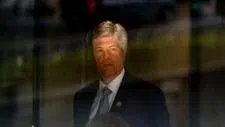Former Nebraska U.S. Representative Jeff Fortenberry is preparing for a second trial regarding campaign finance felonies in federal court. On Tuesday, he filed several motions, including requests for evidence to support claims of selective prosecution based on his political beliefs.
Fortenberry was previously convicted in Los Angeles of concealing conduit campaign donations and lying to federal agents in 2022. However, the 9th U.S. Circuit Court of Appeals overturned those convictions last year, ruling that the trial should have occurred in Nebraska or Washington, D.C., rather than California. This year, federal prosecutors chose to retry the case in D.C., with a trial scheduled for February. The current charges now include one count of lying to federal agents instead of the two he previously faced.
The charges relate to a $30,000 illegal campaign donation from Nigerian businessman Gilbert Chagoury, received through intermediaries at a 2016 fundraiser. Fortenberry is accused of lying about his knowledge of the donation during FBI interviews. He eventually donated the illegal funds to charity, but prosecutors argue this occurred only after his second interview with the FBI.
On Tuesday, Fortenberry’s legal team, which has long argued that his prosecution is politically motivated, formally reiterated this claim in court filings. They asserted that the U.S. Department of Justice is targeting him because of his conservative values and affiliations, citing his consistent support for policies championed by former President Trump.
The motions filed by Fortenberry’s attorneys include requests for discovery on several issues, such as data regarding retrials after appellate reversals and internal communications from prosecutors that may indicate bias. They also seek to disqualify one of the prosecutors from the case.
In addition to highlighting the political contributions made by the lead prosecutor in the previous case, Fortenberry’s defense emphasized the lack of precedent for retrying a defendant who has already received a probationary sentence.
After unsuccessful plea negotiations over the summer, Fortenberry rejected a plea deal that would have involved a guilty plea in exchange for time served, opting instead for a counteroffer to dismiss the case. The prosecution has maintained its decision to continue with the case, and Fortenberry’s attorneys did not provide a comment by the time of publication.


















Comments